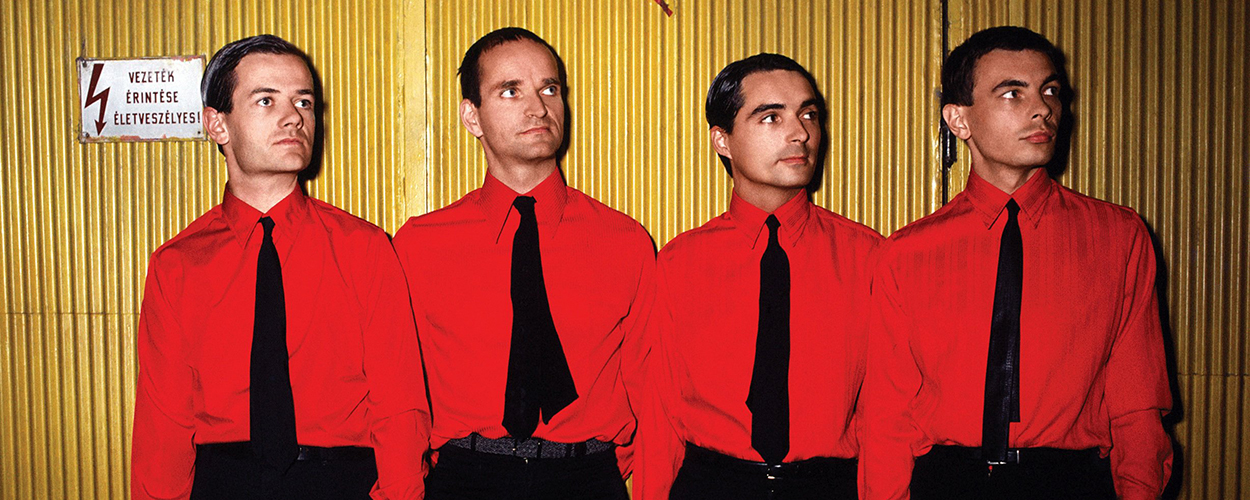This website uses cookies so that we can provide you with the best user experience possible. Cookie information is stored in your browser and performs functions such as recognising you when you return to our website and helping our team to understand which sections of the website you find most interesting and useful.
Business News Legal
European court provides clarity on sampling rules in long-running Kraftwerk case
By Chris Cooke | Published on Tuesday 30 July 2019

The European Court Of Justice has provided some clarity on the ins and outs of sampling from a copyright perspective. Said clarity comes from the ECJ’s ruling in an insanely long running German copyright case involving Kraftwerk.
The court has basically said that – when it comes to sampling a sound recording – however short a snippet a sampler uses, they still need approval from the copyright owner of the original track. Although there’s an important exception that arguably provides some nice new ambiguity alongside the clarity.
A quick recap for all you recap fans. Kraftwerk’s Ralf Hutter sued rapper Moses Pelham way back in the early 2000s over a 1990s track that the latter had made with Sabrina Setlur called ‘Nur Mir’. It used a tiny sample from Kraftwerk’s track ‘Metal On Metal’ on a loop.
The case bounced around the German courts for years. It was accepted that Pelham had indeed sampled ‘Metal On Metal’ without permission, but the question was then posed as to whether such a short uncleared sample could constitute copyright infringement under German law. In 2012, Germany’s Federal Court Of Justice found in favour of Kraftwerk, in part on the basis that Pelham could have easily recreated the sound he sampled, so clipping the snippet out of ‘Metal On Metal’ was just laziness.
Four years later the German Constitutional Court overturned that judgement, reckoning that the lower court hadn’t properly considered Pelham’s “artistic freedom”. The higher court reckoned that the negative impact on Kraftwerk caused by the uncleared sample probably wasn’t sufficient to outweigh the sampler’s artistic rights.
After the Constitutional Court basically sent the matter back to the Federal Court Of Justice, a bunch of questions were subsequently passed on to the EU court requesting clarification on what European law says about sampling.
Generally with the song copyright, it’s assumed that a couple of notes in isolation are not sufficiently substantial for copyright protection to apply. But what about tiny snippets of recordings?
Some would argue that a similar rule should apply to recordings as with songs. But others say that when a track is sampled it’s more straightforward than with song copying, because the sampler is physically copying the original snippet rather than simply replicating a short musical phrase that has been used before.
And that was the conclusion of the EU court’s Advocate General Maciej Szpunar when he published an opinion on the Kraftwerk case last year. He wrote: “A phonogram is not an intellectual creation consisting of a composition of elements such as words, sounds, colours etc. A phonogram is a fixation of sounds which is protected, not by virtue of the arrangement of those sounds, but rather on account of the fixation itself”.
“Consequently”, he went on, “although, in the case of [other creative works], it is possible to distinguish the elements which may not be protected, such as words, sounds, colours etc, from the subject-matter which may be protected in the form of the original arrangement of those elements, such a distinction is not, however, possible in the case of a phonogram”.
The Advocate General’s opinion isn’t binding but is usually influential. And the ECJ judges have now basically endorsed Szpunar’s main argument with their final ruling on this matter.
The court said in a statement yesterday: “Phonogram producers have the exclusive right to authorise or prohibit reproduction in whole or in part of their phonograms. Consequently, the reproduction by a user of a sound sample, even if very short, taken from a phonogram must, in principle, be regarded as a reproduction ‘in part’ of that phonogram so that such a reproduction falls within the exclusive right granted to the phonogram producer”.
But what about the artistic freedom of the sampler that the German Constitutional Court was so concerned about? Well, the ECJ has put some constraints on its main ruling. In particular, if the sampler fucks with the sample so that it is unrecognisable in the final track, well, that’s fine. Because, it seems, sampling isn’t artistic enough to be protected by artistic freedoms, but fucking with samples is.
In the words of the court: “Where a user, in exercising the freedom of the arts, takes a sound sample from a phonogram in order to embody it, in a modified form unrecognisable to the ear in another phonogram, that is not a ‘reproduction'”. That conclusion is necessary, the court then added, to properly balance the rights of an intellectual property owner with the rights of artistic freedom.
So there you go. A bit of clarity – across the European Union at least – regarding what copyright law says about sampling sound recordings, even when the samples are very short indeed. But with a nice little get out that will likely lead to future debates about quite how unrecognisable a skewed sampled needs to be in order to be “unrecognisable”.
Though that debate is unlikely to occur in this particular copyright battle, given Pelham’s use of the ‘Metal On Metal’ snippet was pretty damn recognisable. Which means it’s generally felt that yesterday’s ruling is a win for Kraftwerk, though a final judgement on their case against Pelham will be made in the German courts.





